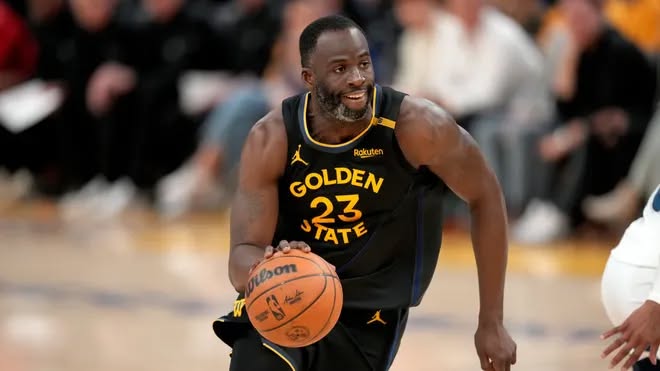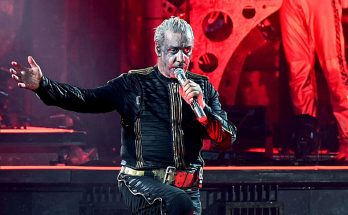Former NBA Player Issues Strong Opinion on Draymond Green’s Role with the Golden State Warriors.
Former NBA players often make headlines with their post-retirement takes, but few have stirred as much buzz recently as one former star who made a bold claim about Golden State Warriors’ veteran forward Draymond Green. Known for his passionate leadership, defensive excellence, and intense on-court persona, Green has long been a polarizing figure in the NBA. To his fans and teammates, he’s the emotional engine of a dynasty. To his critics, he’s an aging player whose antics and declining production may no longer justify his place on a title-contending team. The recent commentary from a former NBA standout has added new fuel to this ongoing debate.
The former star didn’t hold back during a nationally broadcast interview, declaring that Draymond Green is no longer the essential glue guy he once was. Instead, the claim centered around the idea that Green’s influence has diminished both statistically and culturally, and that the Warriors might actually benefit from moving on. It’s a hot take that touches a nerve in the basketball world, particularly among Golden State fans who have come to see Green as a core piece of the franchise’s identity.
Draymond Green, who has been with the Warriors since 2012, played an instrumental role in the team’s four championships alongside Stephen Curry, Klay Thompson, and head coach Steve Kerr. His defensive versatility, high basketball IQ, and emotional intensity helped define a new era of winning basketball in the Bay Area. Whether he was locking down opposing stars, quarterbacking the offense with elite passing, or firing up the team with his vocal leadership, Green was always right in the middle of the action.
But as this former NBA star pointed out, the NBA is a “what have you done for me lately” league. Over the past few seasons, Green has struggled with inconsistency and health issues. His numbers have dipped noticeably—scoring in single digits regularly, shooting percentages fluctuating, and missing time due to both injuries and suspensions. The outbursts that once seemed like vital sparks are now increasingly viewed as distractions. His repeated suspensions, including a costly one during the 2023-24 season, have forced the team to play critical stretches without one of its leaders. And when you’re missing games due to behavior rather than injury, it’s fair game for critics to question your value.
The former player didn’t question Green’s past contributions—on that point, he was clear. He praised Draymond for being the heart and soul of the Warriors during their dominant run. However, he emphasized that success in the NBA is about timing, transition, and tough decisions. He claimed that Golden State is entering a new phase, one where younger players like Jonathan Kuminga and Moses Moody need room to grow, and where the team’s financial commitments must be balanced wisely. With Green locked into a contract that still pays him tens of millions per year, the implication is that his production no longer matches his paycheck.
That kind of analysis is nothing new, but coming from a respected former player—someone who’s been in the locker room and understands the dynamic of a championship team—it carries weight. The comment sparked immediate reactions from fans, media members, and even a few current players. Some rushed to Green’s defense, calling the critique disrespectful and short-sighted. Others nodded in agreement, saying the Warriors are hanging on to nostalgia rather than building toward the future.
For his part, Draymond Green has never been one to shy away from criticism. He’s clapped back at doubters in the past, often using slights as motivation. He’s also shown remarkable self-awareness during interviews and on his podcast, openly discussing the ups and downs of his career. Whether or not he’ll respond to this specific comment remains to be seen, but one thing is certain: he hears everything. And he’s known for responding loudly—whether through his words, his play, or both.
The Warriors front office has some decisions to make in the near future. With Klay Thompson leaving for Dallas and questions swirling around the long-term viability of the team’s aging core, Draymond’s presence is both a comfort and a complication. On one hand, he provides veteran leadership and defensive acumen that few in the league can match. On the other, his volatility and declining offense make him a tough fit in a league increasingly driven by spacing, pace, and efficiency.
The former NBA star’s statement comes at a particularly sensitive moment for the franchise. With Thompson gone and the championship window narrowing, the Warriors are at a crossroads. Do they retool around Curry and Green with hopes of making one final run? Or do they begin the painful process of rebuilding, which could mean letting go of even more franchise icons?
Interestingly, the Warriors seem to be trying to do both. They’ve made moves that suggest they want to remain competitive, but also develop young talent. That’s a tricky balance, and one that becomes even trickier when strong personalities like Draymond Green are involved. Green isn’t just a player—he’s a culture-setter, a leader, and at times, a lightning rod. That’s valuable, but it’s also risky if the leadership message begins to lose its impact or the production no longer justifies the drama.
This isn’t the first time Green has been the subject of trade rumors or critiques. Even during the Warriors’ peak years, there were questions about how long the trio of Curry, Thompson, and Green could stay together. But each time, they responded with resilience and results. The 2022 championship run was a powerful reminder of what the core could still achieve when healthy and locked in. But time doesn’t stop for anyone, and neither does the NBA’s never-ending churn of talent and tactics.
The former NBA player’s critique didn’t just focus on performance—it also touched on locker room dynamics. He hinted that Green’s confrontational style, once a motivator, might now be a hindrance in a locker room with younger voices trying to emerge. Leadership styles that once elevated a team can sometimes become stale or even divisive if not adapted. That’s not necessarily an indictment of Green, but rather a challenge that many veterans face as the years go by.
Still, dismissing Draymond Green outright would be a mistake. Even in the twilight of his prime, he remains one of the most unique players in the league. His ability to defend all five positions, read plays before they develop, and spark energy in his teammates is rare. He’s also shown a willingness to mentor younger players, a trait that can be incredibly valuable during transitional periods. But with the salary cap looming large and the team’s identity shifting, hard choices may be on the horizon.
In the end, this bold claim from a former NBA star does what all great sports commentary should do—it sparks debate. It forces fans, analysts, and executives to ask tough questions: Is loyalty more important than future flexibility? Can a once-crucial player still contribute meaningfully on a contender? And perhaps most importantly, what version of the Warriors will we see moving forward?
Whether Draymond Green remains a Warrior for the rest of his career or eventually moves on, his legacy in Golden State is secure. He helped deliver banners, he changed the way defense is played, and he brought fire to a franchise that desperately needed it. But as the game evolves and the years pass, everyone must adapt—including legends. And sometimes, it takes a voice from the outside to point out what others on the inside may be unwilling to admit.



